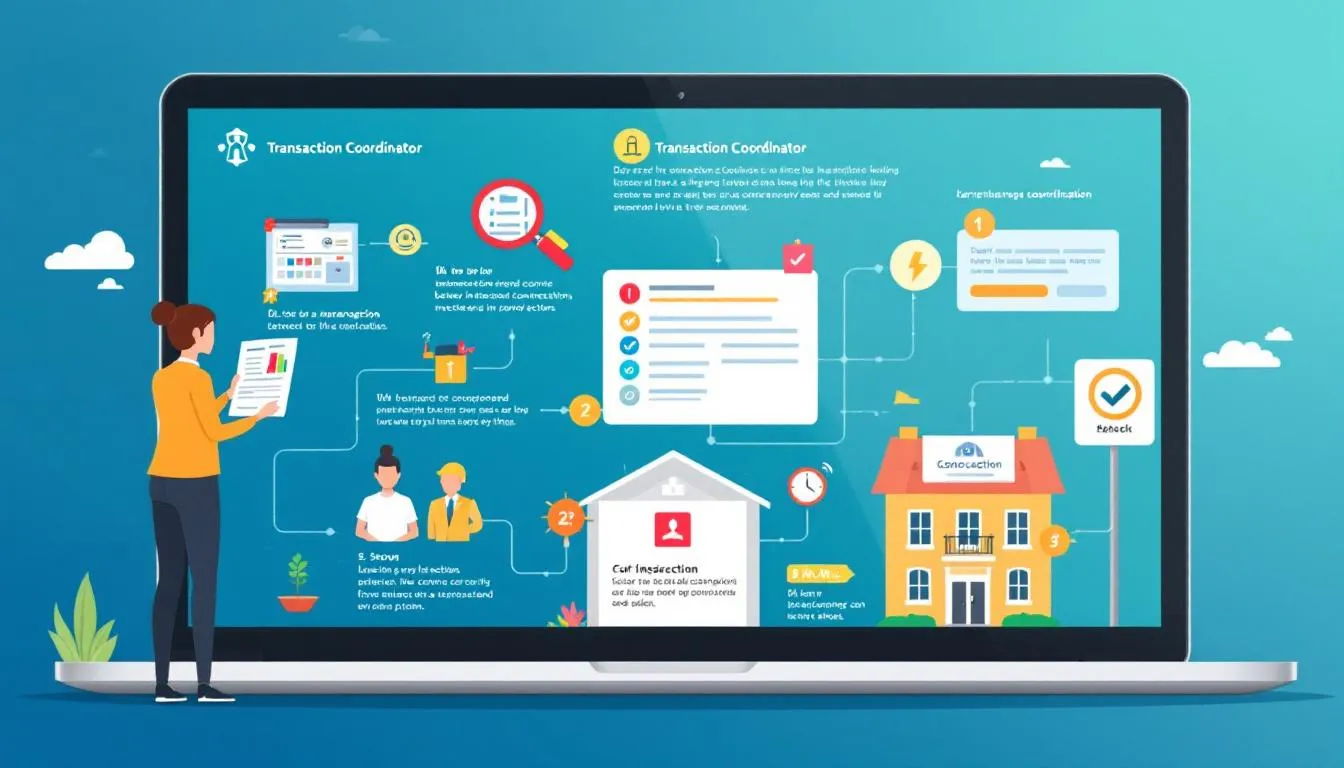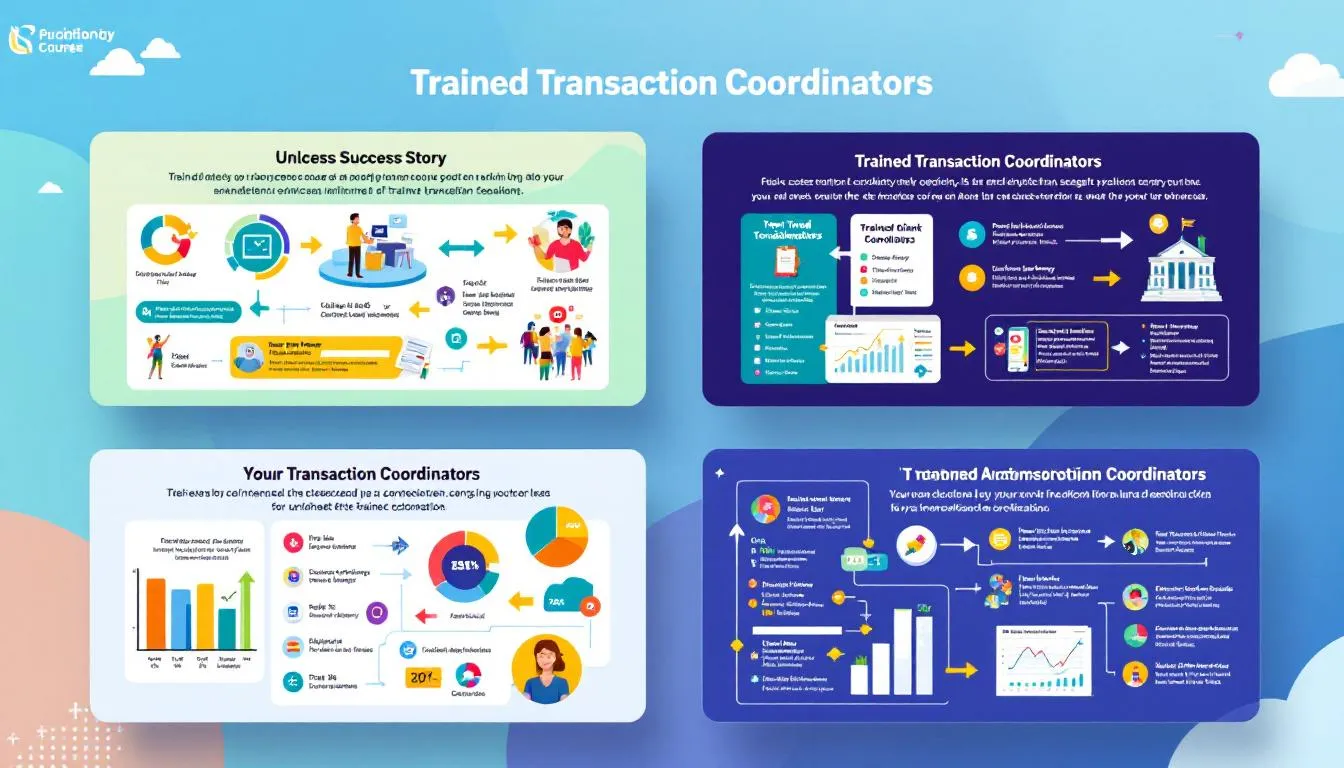The Complete Guide to Transaction Coordinator Training: Best Courses and Certifications for 2025
Your comprehensive roadmap to mastering transaction coordination skills and building a successful career in real estate administration
If you’re exploring a career as a Transaction Coordinator (TC) — or looking to level-up your real-estate admin skills — there are some excellent training programs out there. In this comprehensive roundup we’ll highlight the best TC courses and certifications across the U.S., including both free resources and premium paid options. Think of this as a friendly guide from one aspiring TC to another.
Whether you’re brand-new to the field or an experienced TC aiming to boost your business, there’s something here for you. Let’s dive in!
Key Takeaways
- Transaction coordinators are essential in real estate, managing critical details that ensure smooth property transactions
- Specialized training for transaction coordinators is key to enhancing operational efficiency, client satisfaction, and cost-effective solutions
- A trained Transaction Coordinator (TC) ensures that transactions proceed smoothly, minimizing risks and maximizing efficiency
- Choosing the right training program can significantly boost your skills, confidence, and career in the real estate industry
Understanding the Transaction Coordinator Role

A Transaction Coordinator is the backbone of every successful real estate deal. You’re the professional who manages the administrative process from contract acceptance to closing, ensuring all parties stay on track and deadlines are met. The role of a real estate transaction coordinator is akin to that of an air traffic controller for property deals.
Core Daily Responsibilities
Daily responsibilities include:
- Managing contract timelines and contingency deadlines using comprehensive workflows and checklists
- Coordinating inspections, appraisals, and repairs
- Facilitating communication between buyers, sellers, banks, and title companies
- Reviewing documents for accuracy and completeness
- Tracking required disclosures and compliance items
- Preparing seller packets that include mandatory disclosures about the property’s condition
- Scheduling appointments and managing closing logistics
Licensed vs. Unlicensed Coordinators
Most states allow unlicensed individuals to work as transaction coordinators, but with limitations. Unlicensed TCs can handle administrative tasks but cannot provide real estate advice, negotiate terms, or handle certain client communications. In California, the Certified Transaction Coordinator (CTC) designation provides additional credibility and expanded scope of work.
Transaction coordinators essentially form the backbone of any successful real estate transaction, ensuring smooth and efficient transactions by managing various critical aspects such as escrow accounts, meticulously reviewing contracts, and preventing any last-minute hiccups.
2025 Earning Potential and Market Outlook
Earning Potential in 2025: According to recent salary data, transaction coordinators earn an average of $41,792 annually nationwide, with significant variation by location:
- New York: $61,307 average
- California: $52,400 average
- Texas: $39,850 average
- Alabama: $34,200 average
Independent TCs often earn $300-$800 per transaction, with experienced coordinators handling 15-25 files monthly.
🔗 Join: https://thetcsociety.com | https://www.skool.com/tcsociety
Essential Components of Transaction Coordinator Training
Transaction coordinator training offers a comprehensive insight into the role and responsibilities of the position. The training emphasizes not only the practical aspects of managing transactions but also the standards and innovative practices in real estate. Participants are encouraged to adopt a business-oriented mindset, viewing their role as integral to the success of real estate transactions rather than just a job.
Essential Skills and Tools Mastery
Mastering essential skills and tools is crucial in transaction coordinator training. Skilled transaction coordinators prevent issues by ensuring documents are signed on time and addressing any missing documents promptly. They learn to use various software tools that enhance efficiency in handling client transactions.
Key tools include:
- Comprehensive workflows and document management systems
- Built-in systems that organize and automate processes
- Transaction management software for superior client experience
Transaction coordinators should learn the basics needed to serve clients before investing in expensive software and technology. This foundational knowledge enables them to effectively manage transactions and business basics from day one.
Understanding Real Estate Transaction Flow
Grasping the phases of real estate transactions is essential for any coordinator. The typical workflow of a residential real estate transaction requires a confident understanding of the transaction flow and the involved parties. The training includes learning aids such as step-by-step lists and real-life samples to facilitate this understanding.
Multiple phases in real estate transactions are crucial for understanding the complete process. This comprehensive understanding helps coordinators manage each phase effectively, ensuring a smooth transaction from start to finish.
Compliance and Legal Knowledge Foundation
Compliance and legal knowledge ensure smooth and lawful real estate transactions. The training emphasizes the importance of understanding state-specific laws and regulations governing real estate transactions. Adhering to compliance standards improves trust and efficiency in transaction coordination.
This legal knowledge ensures every transaction is conducted with the highest standards of professionalism and legal security.
Why Transaction Coordinator Training Is Essential

The demand for skilled transaction coordinators is growing significantly in the real estate sector, making specialized training more crucial than ever. Graduates of these programs often find enhanced job security due to this high demand. Training transforms transaction coordinators into invaluable assets, streamlining processes and significantly boosting efficiency.
Here’s why transaction coordinator training is essential:
Enhancing Operational Efficiency
Efficiency is the name of the game in real estate, and transaction coordination training is the key to mastering it. Trained transaction coordinators monitor and enforce deadlines, ensuring that every step of the real estate transaction progresses smoothly and on time. Implementing structured timelines and methods to manage deadlines ensures a seamless flow of transactions.
Trained coordinators manage administrative tasks such as organizing paperwork and handling communications, enabling agents to concentrate on showing properties and closing deals. This approach maximizes efficiency and reduces the risk of miscommunication among transaction parties, resulting in a more streamlined process.
Boosting Client Satisfaction
Client satisfaction is the cornerstone of any successful real estate business. Transaction coordinators play a pivotal role in this by facilitating communication and providing timely updates. This effective communication reduces stress for agents, allowing them to focus on delivering exceptional service to their clients.
Professional training for transaction coordinators leads to higher levels of client service through quicker responses and thorough follow-ups. Managing expectations effectively and providing timely updates, trained coordinators enhance client satisfaction, ensuring every client feels supported and confident throughout the transaction process.
Cost-Effective Solutions
In a competitive market, cost-effective solutions can make a significant difference. Training virtual assistants as transaction coordinators can lead to substantial savings compared to hiring full-time staff. This approach allows businesses to scale their operations flexibly, without the overhead costs of permanent hires.
Meeting legal and regulatory standards is vital for transaction success in real estate. The training equips virtual assistants with the knowledge to handle essential documents like contracts and disclosures while adhering to local and federal guidelines, providing efficient and compliant transaction coordination.
State-by-State Training Requirements
Understanding your state’s requirements is crucial before selecting training:
State-by-State Requirements
California: Requires Certified Transaction Coordinator (CTC) certification for certain activities. The 5-course program costs $698-$735 and must be renewed every 2 years.
Texas: No licensing required for transaction coordination. TCs can work independently without state certification.
Florida: No specific licensing requirements, but many brokerages prefer certified coordinators.
New York: No state certification required, though real estate license helpful for expanded responsibilities.
Most Other States: Generally allow unlicensed transaction coordination with proper supervision and scope limitations.
2025 Regulatory Updates
The transaction coordinator landscape continues evolving with new regulatory considerations and market demands that affect training requirements and career opportunities.
Top Transaction Coordinator Training Programs
TC Society – Free Community & Training by Melissa Kiser
TC Society is an online community for real-estate TCs founded by Melissa Kiser. It’s a one-stop hub where you can network with peers, learn best practices, and even get mentorship — all for free.
- Format: Online community (hosted on Skool) with on-demand training resources and weekly live Q&A calls. Optional premium “TC University” membership provides deeper training.
- Price: Free to join. Premium tier is $47 /month.
- Certification: None. (You may receive course completion certificates inside the community.)
- Focus: Practical skills, marketing your TC business, tool tutorials (e.g., Folio), weekly troubleshooting sessions.
- Ideal for: Aspiring and experienced TCs who want mentorship, efficiency tips, and a supportive peer network.
🎥 YouTube Gem — Cecilia V Peralta
| Quick Stats | Why Hit “Subscribe”? |
|---|---|
| 1.3K+ subscribers and 50+ videos | Bite-sized tutorials & live replays that demystify paperwork, tools, and client wrangling. |
| Licensed FL agent & indie TC coach | Friendly ask-me-anything vibe; Cecilia answers questions right in the comments. |
Sample videos
- “Overview of Real-Estate Transaction Coordinator Tasks — From Contract to Closing”
- “Save Hours with Templates: Must-Have TC Time-Savers”
- “Top 5 TC Mistakes Costing You Clients & Money”
🔗 Watch: https://www.youtube.com/@CeciliaVPeralta
🚀 Course Coming Soon — TC Lab: Coordination Virtual Playbook
- 7 self-paced modules (TC basics, tools, branding, scaling, and more)
- 20+ plug-and-play templates (emails, SOPs, checklists)
- 12 group-coaching replays + 12 weeks email support
- 1-on-1 coaching call to troubleshoot your first files
Why join the wait-list? Early-bird pricing, lifetime access, and a voice in shaping the curriculum.
🔗 Wait-list: https://cvpvirtual.com/tc-lab/
Transaction Coordinator Bootcamp (by Joni Bickel)
A comprehensive self-paced program that takes you from zero experience to running your own home-based TC business in ~60 days.
- Format: Video modules with lifetime access, private Facebook group, optional 1-on-1 coaching.
- Price: $1,297 (one-time). Payment plans & periodic discounts available.
- Certification: Certificate of completion; no official license.
- Focus: Full contract-to-close workflow and business launch kit (checklists, email templates, website template, branding assets).
- Ideal for: Anyone who wants to start an independent TC business and values a step-by-step roadmap.
🔗 Details / wait-list: https://transactioncoordinatortraining.co
Kristi Winfree’s Transaction Coordinator Game Plan Courses
Two modular courses—Foundations and Growth—plus massive template libraries.
- Format: Self-paced video courses (Kajabi) with lifetime access and optional group-coaching calls.
- Price:
- $1,500 (Foundations + template toolkit)
- $697 (Growth course only)
- Larger bundles add databases & coaching.
- Certification: Course completion certificates (private).
- Focus: Foundations = core TC workflow + 35 checklists & 315 email templates. Growth = hiring, scaling, advanced systems.
- Ideal for: New TCs needing turnkey systems, or experienced TCs ready to hire/team-build.
🔗 Explore: https://kristiwinfree.com
Cultivate Wins — TC Coaching & Training Membership (David Breckheimer)
A $12 /month membership that unlocks an entire library of TC courses, templates, webinars, and live challenges — essentially the Netflix of TC training.
- Format: On-demand courses, recorded workshops, templates, live meet-ups, community forums.
- Price: $12 /month (cancel anytime). Optional 1-on-1 coaching from $389 /month.
- Certification: None (practical training focus).
- Focus: Technical TC skills and small-business growth, time management, marketing, leadership.
- Ideal for: Budget-conscious learners and anyone who likes ongoing support instead of a big upfront spend.
🔗 Join: https://cultivatewins.com
C.A.R. Certified Transaction Coordinator (CTC) Program
A formal 5-course designation from the California Association of REALTORS®.
- Format: Online self-paced or live webinars. Five required courses, exam for each.
- Price: $349 (C.A.R. members) / $698 (non-members).
- Certification: Yes — Certified Transaction Coordinator (renew every 2 years).
- Focus: Compliance, disclosures, risk management, CA real-estate law/forms.
- Ideal for: California-based TCs, licensed agents, or detail-oriented coordinators wanting a recognized credential.
🔗 Details: https://www.car.org/education/designations/certified-transaction-coordinator
OnlineEd — Transaction Coordinator Essentials
A national “TC 101” crash course.
- Format: Self-paced online modules with knowledge checks.
- Price: $249 (one-time).
- Certification: Certificate of completion (OnlineEd).
- Focus: Core TC best practices, contingency tracking, communication, generic (non-state-specific) forms.
- Ideal for: Aspiring TCs nationwide who want an affordable fundamentals course.
🔗 Enroll: https://www.onlineed.com (search “Transaction Coordinator Essentials”)
Transaction Coordinator Academy (Michelle Spalding)
Friendly mentor-style courses covering TC skills and business launch.
- Format: On-demand video modules, exercises, optional live Q&A.
- Price:
- $298 — Transaction Coordinator Essentials
- $348 — Transaction Coordinating as a Business
- $88 — “Simple Marketing Solutions” mini-course
- Certification: Course completion certificates (private).
- Focus: Essentials = day-to-day TC workflow; Business = setting up & growing an independent TC shop.
- Ideal for: Learners who prefer moderate pricing, lifetime access, and a mentor’s perspective.
🔗 Courses: https://transactioncoordinatoracademy.com
New & Emerging Training Providers (2025)
Top Tier TC
Premium coaching program focusing on both traditional transactions and creative real estate deals like wholesaling and fix-and-flip projects.
- Format: Group coaching, masterclasses, and networking events
- Price: $950-$1,500/month for “Quantum Leap” program
- Focus: High-level business strategy and diversified income streams
- Ideal for: Experienced TCs ready to scale or enter specialized markets
🔗 Learn more: https://www.toptiertc.com
VPM Academy (Free Training)
Comprehensive free training program for users of VPM Solutions’ transaction management platform.
- Format: Self-paced online modules with practical exercises
- Price: Free (VPM software subscription required)
- Focus: Platform-specific training with general TC principles
- Ideal for: Teams already using VPM or considering the platform
- Special Features: Quick and user-friendly enrollment process - simply log into your VPM Solutions account and navigate to the Training section
🔗 Access: https://www.vpmsolutions.com
OPS Boss Coaching
Elite coaching program for high-performing TCs and real estate operations managers.
- Format: 1-on-1 coaching with group mastermind components
- Price: $950-$1,500/month
- Focus: Systems optimization, team building, and profit maximization
- Ideal for: Established TCs earning $100K+ annually
Technology and AI Integration in 2025
Modern transaction coordinators must master technology to stay competitive. Here are the essential tools and emerging AI applications:
Essential Software Skills
- Transaction Management Platforms: SkySlope, Paperless Pipeline, dotloop
- AI Assistants: ListedKit’s “Ava” can reduce administrative costs by 60%
- Communication Tools: Slack, Microsoft Teams, specialized client portals
- Document Management: DocuSign, Adobe Sign, cloud storage systems
Emerging AI Applications
Transaction coordinators are increasingly using AI for:
- Automated deadline tracking and reminders
- Document review and error detection
- Client communication templates
- Market data analysis and reporting
Training programs now include AI literacy as a core competency, preparing TCs for the evolving technological landscape.
How to Choose the Right Training Program
Choosing the right training program is vital for effective learning and development in the transaction coordinator role. Consider the format of the training, whether it’s in-person, online, or a hybrid model, to find the most convenient option for your schedule. Evaluating instructor experience and expertise in real estate transactions significantly impacts the quality of your training.
Key Selection Factors
Consider these factors:
- Format compatibility: In-person, online, or hybrid options
- Instructor credentials: Experience and expertise in real estate transactions
- Student feedback: Reviews and testimonials from past participants
- Mentorship opportunities: Programs offering individualized coaching
- Practical components: Hands-on training, real-life case studies, and internships
- Course materials: Comprehensive workbooks, presentations, and sample documents
Feedback from past students provides valuable insights into the effectiveness and value of a training program. Courses with mentorship or individualized coaching often lead to better skill acquisition and confidence. Practical components, such as hands-on training or real-life case studies, enhance understanding and application of knowledge.
Decision Framework by Experience Level
For Career Changers (No Real Estate Experience):
- Start with: OnlineEd TC Essentials ($249) or TC Society (Free)
- Follow with: Transaction Coordinator Academy ($298-$348)
- Budget: $300-$600 total
For Real Estate Professionals:
- California: C.A.R. CTC Program ($349-$698) - required for compliance
- Other States: Kristi Winfree Foundations ($1,500) for comprehensive systems
- Budget: $350-$1,500
For Aspiring Business Owners:
- Recommended: Transaction Coordinator Bootcamp ($1,297)
- Alternative: Cultivate Wins membership ($12/month) + coaching ($389/month)
- Budget: $400-$1,500
For Scaling Existing Business:
- Top Choice: Top Tier TC or OPS Boss Coaching ($950-$1,500/month)
- Alternative: Kristi Winfree Growth course ($697)
- Budget: $700-$18,000 annually
Budget-Based Decision Framework
Selecting the best training depends on your specific goals and circumstances:
- Free Options: TC Society, VPM Academy, YouTube resources
- Under $500: OnlineEd, Transaction Coordinator Academy, C.A.R. (members)
- $500-$1,500: Most comprehensive programs with templates and systems
- $1,500+: Premium coaching and business scaling programs
Success Stories and Career Outcomes

Success stories from trained transaction coordinators testify to the effectiveness of specialized training programs. Many have successfully started their own businesses, secured clients, and now work from home, managing their own transaction coordination operations.
Real Success Examples
Real success examples:
- Coordinators who have grown significant transaction coordination businesses
- Professionals described as “warm, funny, smart, and innovative” who think outside the box
- Many who have achieved increased income and excel in their roles
- Building reputations for excellent client service leading to repeat business and client retention
Effective Strategies for Success
Effective strategies for success:
- Developing effective marketing strategies crucial for securing clients
- Building a reputation for excellent client service
- Focusing on repeat business and client retention
- Networking effectively within the real estate community
These inspiring examples highlight the growth and success potential proper training can unlock, leading to increased income and professional excellence.
Career Outlook and Earning Potential
The transaction coordinator role continues growing as real estate complexity increases and agents seek specialized support.
2025 Market Demand
- 85% of TCs now work remotely, expanding geographic opportunities
- Growing specialization in luxury, commercial, and investment properties
- Increased demand for AI-savvy coordinators who can leverage technology
- Hybrid roles combining TC duties with marketing and client services
Earning Progression Timeline
Months 1-6: $25,000-$35,000 annually (learning phase) Year 1: $35,000-$50,000 (established systems) Years 2-3: $50,000-$75,000 (specialized expertise) Years 3+: $75,000-$150,000+ (business ownership/premium services)
Income Models
- Employee: $30,000-$60,000 annual salary plus benefits
- Per-Transaction: $300-$800 per file (15-25 files/month potential)
- Retainer: $2,000-$5,000/month per agent or team
- Hybrid Services: TC + marketing/admin support at premium rates
At-a-Glance Program Comparison
| Course / Provider | Format | Price | Certificate? | Ideal For |
|---|---|---|---|---|
| TC Society (Melissa Kiser) | Community + resources | Free (optionally $47/mo) | No | All levels seeking peer support & ongoing tips |
| Transaction Coordinator Bootcamp (Joni Bickel) | Self-paced course + FB group | $1,297 | Completion | Aspiring independent TCs wanting a full business launch kit |
| Kristi Winfree – Game Plan | Self-paced courses | $1,500 (Foundations bundle) / $697 (Growth) | Completion | New TCs (turnkey templates) & scaling TCs |
| Cultivate Wins (David Breckheimer) | Membership library | $12 /mo | No | Budget learners wanting continual training & community |
| C.A.R. CTC | 5-course series | $349 (member) / $698 (non-member) | Yes | CA TCs or those desiring a recognized credential |
| OnlineEd TC Essentials | Self-paced course | $249 | Completion | Nationwide beginners needing a solid fundamentals class |
| Transaction Coordinator Academy (Michelle Spalding) | Two self-paced courses | $298 / $348 | Completion | Beginners & solopreneurs who like mentor-style guidance |
| Top Tier TC | Group coaching | $950-$1,500/mo | No | Experienced TCs scaling to premium markets |
| VPM Academy | Free online training | Free (VPM subscription required) | Completion | Teams using or considering VPM platform |
Why Professional Training Makes the Difference
Picture yourself as the backstage manager of a real-estate deal. Agents hustle for listings; buyers dream of patios. You keep dates straight, paperwork spotless, and every signature in its place—so closing day feels like a victory lap, not a scramble.
Key benefits of professional training:
- Confidence & credibility: A structured course hands you checklists, templates, and real-world hacks you can reuse forever
- Job security: Every home sale needs someone minding the paperwork
- Flexible earnings: TCs often bill per file or on retainer—more control over income, fewer weekend showings
- Hero status: Saving deals from blowing up at the eleventh hour feels amazing (clients remember the rescue)
- Technology advantage: Proper training includes AI and automation skills that increase efficiency and earnings
Starting Your Independent TC Business
Thinking of Going Solo?
- Plan the business: Choose an LLC name, open a bank account, grab E&O insurance
- Price your services: Per-file, monthly package, or hybrid
- Find your first clients: Brokerage meetings, Facebook agent groups, partner with busy teams
- Systemize: Templates, canned emails, smart tech tools (dotloop, SkySlope, DocJacket), and maybe a VA once you’re slammed
- Embrace technology: Learn AI tools and automation to handle more volume efficiently
Pro tip: Brand yourself online (website + LinkedIn + Instagram) so agents can vet you in 30 seconds flat.
Quick Recap & Next Steps
- TCs are the unsung heroes of smooth closings—high demand, flexible lifestyle
- Training = shortcut to credibility (and higher fees)
- Pick a course under $500 to nail the fundamentals, then practice on every deal you can
- Technology skills are essential in 2025 - choose training that includes AI and automation
- Thinking bigger? Turn your skills into a business with solid branding and repeatable systems
We encourage you to take the first step towards a rewarding career by enrolling in a transaction coordinator training course. With the right training, you can transform your career and become an invaluable asset in the real estate sector.
Grab a course, dive in, and start coordinating like a pro—the real-estate world is waiting for you to keep its deals on track!
Happy learning, and here’s to your thriving TC career! 🎉
Frequently Asked Questions
Why is transaction coordinator training important?
Transaction coordinator training is essential as it equips you with the skills needed to meet the growing demand and enhances your job security. By mastering these processes, you can significantly streamline real estate transactions and boost your career!
Who should consider transaction coordinator training?
If you’re new to real estate, switching careers, or aiming to start your own transaction coordination business, then transaction coordinator training is perfect for you. Embrace this opportunity to enhance your skills and thrive in the industry!
How do I choose the right training program?
Choosing the right training program means aligning it with your career goals and ensuring it offers experienced instructors, good feedback, and hands-on experiences. This thoughtful approach will set you up for success!
What are the benefits of specialized training programs?
Specialized training programs not only save you time and money but also significantly enhance client satisfaction and provide tailored education to meet specific needs. Embrace this opportunity to elevate your skills and impact!
How can I enroll in a transaction coordinator training course?
You can easily enroll in a transaction coordinator training course by logging into your VPM Solutions account and navigating to the Training section. It’s quick and free for registered users, so take this step towards enhancing your skills today!
References and Resources
- Glassdoor - Real Estate Transaction Coordinator Salary Data
- Zippia - Transaction Coordinator Demographics and Statistics
- California Association of Realtors - Certified Transaction Coordinator Program -Freedom Real Estate Services - Transaction Coordinator Licensing Requirements
- Top Tier TC - Premium Transaction Coordinator Training
- VPM Solutions - Transaction Coordinator Training Course
- AgentUp - AI Transaction Coordinator Tools
- AgentUp - Future of Real Estate Transaction Coordination
- NAR - 2025 Professional Standards Changes
- Transaction Coordinator Academy Course List
- Cultivate Wins - Coaching and Training -Paperless Pipeline - Starting a TC Business





